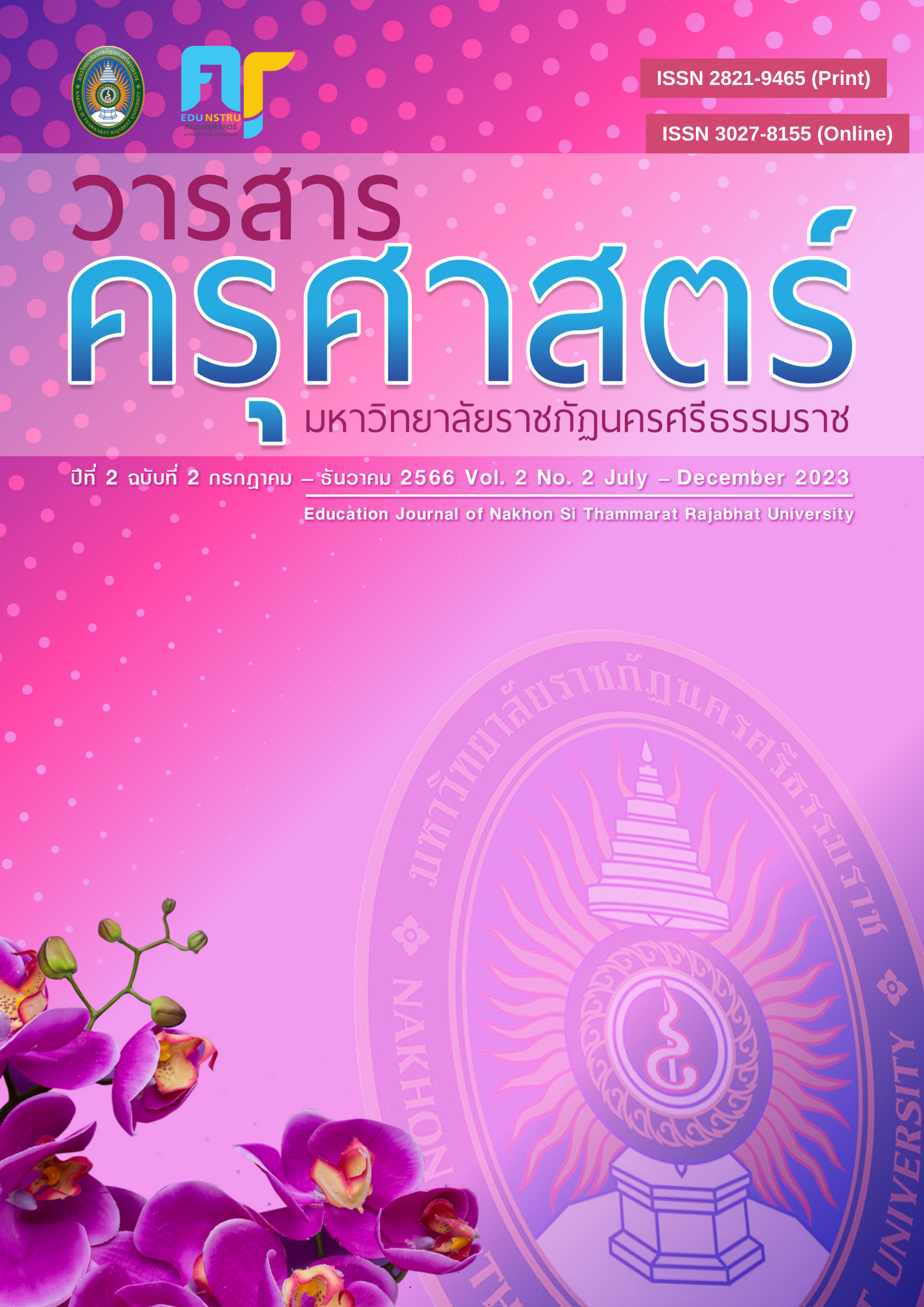Self - Management of Early Childhood Children
Main Article Content
Abstract
Early childhood self-management abilities are the future skills that children should have because early childhood is an important time for laying the foundation for education that will be beneficial in the future. Through which children can recognize and appreciate themselves and others of the child. able to plan and organize activities and conflict resolution while doing creative activities Through an experience organized according to the concept of active learning management that is child centered. By combining the principles of developing brain skills or EF (Executive Function) and life skills that focus on organizing experiences through play. and take action can direct and control their own behavior in doing activities with others in daily life When encountering a problematic situation or obstacles in performing activities, being able to think, plan and make decisions to solve problems rationally. Through self-management, learn how to observe, think, decide, act, and solve problems by yourself according to individual differences. and situations encountered in daily life with others happily This leads to the development of early childhood self-management abilities, which is a skill of the future.
Article Details

This work is licensed under a Creative Commons Attribution-NonCommercial-NoDerivatives 4.0 International License.
บทความที่ได้รับการตีพิมพ์เป็นลิขสิทธิ์ของวารสารครุศาตร์ มหาวิทยาลัยราชภัฏนครศรีธรราช
ข้อความที่ปรากฏในบทความแต่ละเรื่องในวารสารวิชาการเล่มนี้เป็นความคิดเห็นส่วนตัวของผู้เขียนแต่ละท่านไม่เกี่ยวข้องกับวารสารครุศาสตร์ มหาวิทยาลัยราชภัฏนครศรีธรรมราช
References
กระทรวงศึกษาธิการ. (2563). คู่มือการคัดเลือกครูต้นแบบทักษะชีวิต. สำนักงานคณะกรรมการการศึกษาขั้นพื้นฐาน กระทรวงศึกษาธิการ.
กรรณิการ์ แสนสุภา, และนเรศ กันธะวงศ์. (2564). การจัดการตนเอง: ทักษะในการพัฒนาตนเองอย่างยั่งยืน. วารสารศิลปศาสตร์ (วังนางเลิ้ง) มทร. พระนคร, 1(1), 25-37.
จารุทัศน์ วงศ์ข้าหลวง.การศึกษาผลงานศิลปะของเด็กอายุ 5-6 ปีที่ได้รับการจัดประสบการณ์ตามแนวการศึกษาวอลดอร์ฟและเรกจิโอเอมิเลีย. ปริญญานิพนธ์ กศ.ม. (ศิลปศึกษา). กรุงเทพฯ:บัณฑิตวิทยาลัยมหาวิทยาลัยมหาวิทยาลัยศรีนครินทรวิโรฒ,2551.
ชดช้อย วัฒนะ. (2558). การสนับสนุนการจัดการตนเอง: กลยุทธ์ในการส่งเสริมการควบคุมโรค. วารสาร วิทยาลัยพยาบาลพระปกเกล้าจันทบุรี, 26(1), 117 – 127.
ธันยพร จารุไพศาล. (2564). การบริหารจัดการตนเอง (Self-management) คืออะไร และเทคนิคในการพัฒนา. สืบค้นจาก https://www.entraining.net/library.php
นันทิยา ตันศรีเจริญ.(2564) ครูผู้มองเห็นสภาวะการเรียนรู้ของเด็ก (Visible Learning). (พิมพ์ครั้งที่ 1). กรุงเทพฯ : บริษัท แปลน พับลิชชิ่ง จำกัด
วิจารณ์ พานิช. (2556). การสร้างการเรียนรู้สู่ศตวรรษที่ 21. กรุงเทพฯ : มูลนิธิสยามกัมมาจล
วรรธนา นันตาเขียน. (2563). การพัฒนารูปแบบการจัดประสบการณ์การเรียนรู้เชิงบูรณาการเพื่อส่งเสริมความสามารถในการคิดเชิงบริหารสำหรับเด็กปฐมวัย. สืบค้นจาก
http://ir-ithesis.swu.ac.th/dspace/bitstream/123456789/1279/1/gs591150011.pdf
สำนักงานเลขาธิการสภาการศึกษา. (2552). รูปแบบการจัดกิจกรรมการเรียนรู้สำหรับเด็กปฐมวัยอายุ 3-5 ปี ตามสมรรถนะของเด็กปฐมวัยในการพัฒนาตามวัย. กรุงเทพฯ : บริษัท พริกหวานกราฟฟิค จำกัด
สำนักวิจัยและพัฒนาการศึกษา. (2564). ทักษะที่จำเป็นแห่งอนาคต (Future Skill เพื่อเตรียมการพัฒนาคุณภาพคนไทยทุกช่วงวัยรองรับการเปลี่ยนแปลงอย่างรวดเร็ว (Disruption) ของโลกศตวรรษที่ 21 : ผลการศึกษาและแนวทางการส่งเสริม. (พิมพ์ครั้งที่ 1). กรุงเทพฯ : บริษัท เพชรเกษมพริ้นติ้ง กรุ๊ป จำกัด
อลิสา เลี้ยงรื่นรมย์. (2564). 14 วิธีการสอนเชิงรุก ผู้เรียนสนุก ผู้สอนสบาย. สงขลา : มหาวิทยาลัยหาดใหญ่
องค์การแพลน อินเตอร์เนชั่นแนล (ประเทศไทย). (ม.ป.ป). เอกสารคู่มือทักษะชีวิต กิจกรรมเพื่อพัฒนาทักษะชีวิต. มูลนิธิ ไร้ท์ ทู เพลย์ ประเทศไทย
Bandura, A. (1997). Self-Efficacy: The Exercise of Control. New York: W.H. Freeman & Company.
Bakhshi, H., Downing, J., Osborne, M. & Schneider, P. 2017. The Future of Skills: Employment in 2030. London: Pearson and Nesta.
Bonwell, C.C.; & Eison.J. A. (1991). Active Learning: Creative Excitement in the Classroom. ASHE-ERIC Higher Education Reports No. 1. Washington, D.C.
Creer, T. L. (2000). Self-management. In M. Bockaeets, R. Pintrich & M. Zeidner (Eds.), Handbook of Self regulation. San diego, California: Academic Press.
Curtin, R. B., Walters, B. A. J., Schatell, D., Pennell, P., Wise, M., & Klicko, K. (2008). Self-Efficacy and Self-Management Behaviors in Patients With Chronic Kidney Disease. A journal of the National Kidney Foundation, 15(2), 191-205.
Riegel, B., Carlson, B., & Glaser, D. (2000). Development and testing of a clinical tool measuring self-management of heart failure. Heart and Lung, 29(1), 4-15.

